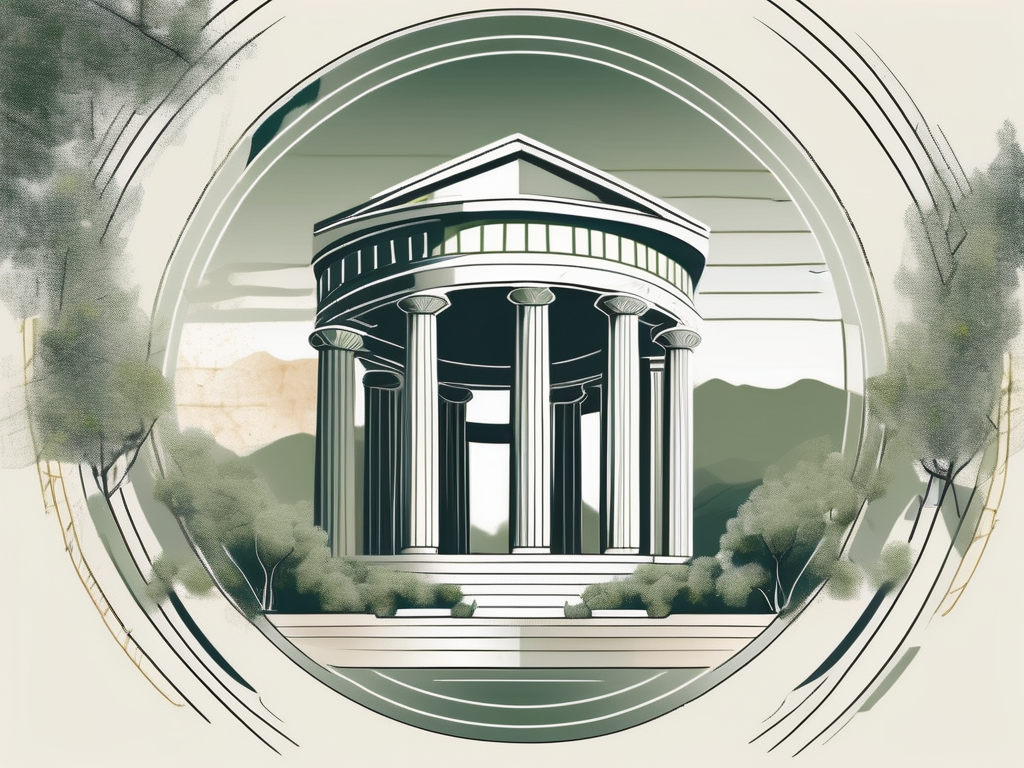Stoicism is a philosophy that has stood the test of time. Its teachings have resonated with individuals seeking peace, clarity, and resilience in their lives. In this article, we will explore the origins, principles, core concepts, and modern applications of Stoicism. We will also address common misconceptions about this ancient philosophy. So, grab a cup of tea, sit back, and let’s dive into the world of Stoicism!
The Origins of Stoicism
Stoicism, an ancient Greek philosophy, has a rich and fascinating history that dates back to the 3rd century BCE. It was founded by a man named Zeno of Citium, who drew inspiration from the teachings of earlier philosophers such as Socrates and Heraclitus. Zeno developed Stoicism as a way to navigate the complexities of life and find inner peace.
As Stoicism gained popularity in Greece, it soon spread throughout the vast expanse of the Roman Empire. This philosophy exerted a profound influence on both the Western and Eastern worlds, shaping the thoughts and actions of countless individuals across different cultures and societies.
Key Philosophers of Stoicism
Several philosophers played significant roles in shaping Stoicism, each contributing their unique perspectives and insights. One of the most renowned figures in Stoicism is Epictetus, a former slave who rose to prominence as a philosopher. Epictetus emphasized the importance of focusing only on things within our control, teaching his followers to find contentment by accepting the inevitable and adapting to circumstances.
Another influential Stoic philosopher was Seneca, a Roman statesman who delved deeply into the idea of maintaining tranquility amidst life’s challenges. Seneca’s writings explored various aspects of Stoicism, offering practical advice on how to navigate the complexities of human existence while remaining true to one’s principles.
Marcus Aurelius, the Roman Emperor, is also considered a key figure in Stoicism. His book, “Meditations,” chronicles his personal reflections on the philosophy and serves as a guide for individuals seeking to live a virtuous and meaningful life. Marcus Aurelius’s writings provide valuable insights into the practical application of Stoic principles in everyday situations.
Historical Context of Stoicism
To fully understand Stoicism, it is essential to consider the historical context in which it emerged. Stoicism arose during a time of political and social upheaval, providing individuals with a path to finding inner peace and strength amidst adversity. The teachings of Stoicism resonated deeply with people from all walks of life, offering solace and clarity in troubled times.
In ancient Greece and the Roman Empire, Stoicism provided a philosophical framework that helped individuals navigate the challenges of daily life. Whether facing personal hardships or societal turmoil, Stoic principles offered a way to cultivate resilience, self-control, and a sense of purpose.
Stoicism’s influence extended beyond the ancient world, shaping the thoughts and actions of countless individuals throughout history. Even today, Stoic principles continue to resonate with people seeking guidance on how to live a meaningful and fulfilling life.
By exploring the origins, key philosophers, and historical context of Stoicism, we gain a deeper appreciation for this ancient philosophy’s enduring legacy. Stoicism’s teachings continue to inspire individuals to cultivate inner strength, find tranquility amidst chaos, and strive for virtue in an ever-changing world.
Basic Principles of Stoicism
Stoicism, a philosophy that originated in ancient Greece, is founded on a set of fundamental principles that guide its practitioners towards a virtuous and fulfilling life. These principles, rooted in logic and reason, provide a framework for navigating the complexities of human existence.
Two key principles of Stoicism are the cultivation of virtue and the understanding of the dichotomy of control. These principles, when embraced and applied, can lead to a life of tranquility, resilience, and moral excellence.
The Role of Virtue in Stoicism
Virtue lies at the heart of Stoicism. The Stoics believed that the key to living a good life is to cultivate wisdom, justice, courage, and temperance – the four cardinal virtues. These virtues are not mere abstract concepts but practical guides for ethical living.
By embodying these virtues in our thoughts, actions, and decisions, we align ourselves with nature and live in harmony with the world. The cultivation of virtue is an ongoing process that requires self-reflection, discipline, and a commitment to personal growth.
Wisdom, the first cardinal virtue, involves seeking knowledge, understanding the nature of reality, and making sound judgments. Justice, the second virtue, entails treating others with fairness, kindness, and respect. Courage, the third virtue, is the ability to face adversity and challenges with strength and resilience. Lastly, temperance, the fourth virtue, involves practicing moderation and self-control in all aspects of life.
By striving to embody these virtues, Stoics aim to become virtuous individuals who contribute positively to society and live a life of moral integrity.
Understanding the Dichotomy of Control
The Stoics recognized that there are things within our control and things beyond our control. They emphasized the importance of focusing solely on the things we can control, such as our thoughts, choices, and actions. This principle, known as the dichotomy of control, is central to Stoic philosophy.
By accepting that external circumstances are beyond our control and learning to adapt to them, we attain a sense of inner peace and freedom. Stoics believe that our happiness and well-being depend not on external events but on our own attitudes and responses to those events.
For example, while we cannot control the weather, we can control how we react to it. Instead of becoming frustrated or upset by a rainy day, a Stoic would choose to embrace the rain and find joy in the sound of droplets on the windowpane or the fresh smell of wet earth.
This principle extends beyond external circumstances to include the actions and opinions of others. Stoics recognize that we have no control over how others behave or what they think of us. Instead of seeking validation or approval from others, Stoics focus on their own character and virtue.
By practicing the dichotomy of control, Stoics develop resilience, emotional stability, and a sense of inner calm. They become masters of their own minds, unaffected by the unpredictable and often uncontrollable nature of the external world.
In conclusion, Stoicism offers a practical philosophy for living a virtuous and fulfilling life. By cultivating virtue and understanding the dichotomy of control, individuals can navigate the complexities of existence with wisdom, resilience, and inner peace.
Core Concepts of Stoicism
Stoicism encompasses a range of core concepts that shape its philosophy of life. Two significant concepts are the Stoic view of emotions and the Stoic approach to adversity.
Stoicism, an ancient Greek philosophy founded by Zeno of Citium in the 3rd century BC, offers a practical and ethical guide to living a fulfilling life. It provides individuals with a framework to navigate the challenges and uncertainties of existence, promoting virtues such as wisdom, self-control, and courage.
The Stoic View of Emotions
According to Stoicism, emotions arise from our judgment of external events rather than the events themselves. The Stoics believed that our emotions are not caused by external circumstances, but by our interpretation of those circumstances. For example, if we perceive an event as harmful or unfair, we may experience anger or sadness. However, if we view the same event as an opportunity for growth or a chance to exercise virtue, we can transform our emotional response.
Stoics emphasize the importance of adopting a rational and impartial perspective when evaluating events. By cultivating an objective mindset, we can learn to regulate our emotions and cultivate tranquility even in the face of challenging circumstances. This does not mean suppressing or denying our emotions, but rather understanding their origin and choosing how to respond to them.
The Stoic Approach to Adversity
Stoicism teaches us to embrace adversity as an opportunity for personal growth and character development. Rather than viewing hardships as obstacles, Stoics see them as tests that enable us to cultivate resilience, patience, and fortitude. The Stoic philosopher Epictetus famously said, “It’s not what happens to you, but how you react to it that matters.”
Stoics believe that by accepting and embracing adversity, we can develop inner strength and become better equipped to face future challenges. They advocate for an attitude of acceptance and detachment, recognizing that we cannot control external events, but we can control our response to them. This mindset allows us to navigate life’s difficulties with grace and equanimity.
Moreover, Stoicism encourages individuals to focus on what is within their control, namely their own thoughts, attitudes, and actions. By directing our attention towards the things we can influence, we can avoid wasting energy on futile concerns and instead channel it towards personal growth and the pursuit of virtue.
In conclusion, Stoicism offers a profound understanding of human nature and provides practical tools for living a meaningful and fulfilling life. By adopting the Stoic view of emotions and embracing adversity as an opportunity for growth, we can cultivate tranquility, resilience, and wisdom in the face of life’s challenges.
Stoicism in Modern Life
Stoicism, an ancient philosophy that originated thousands of years ago, continues to hold immense relevance in the complexities of modern life. Its principles offer practical tools that can be applied today, enabling individuals to navigate challenges and cultivate a more fulfilling existence. By practicing self-reflection, focusing on what can be controlled, and approaching difficulties with equanimity, Stoicism empowers individuals to lead healthier relationships with themselves and others.
One of the key aspects of Stoicism is self-reflection. In a world filled with constant distractions and external influences, taking the time to introspect and understand oneself becomes increasingly crucial. Stoic practitioners engage in regular self-reflection, examining their thoughts, emotions, and actions. This practice allows them to gain insight into their own values, desires, and fears, ultimately leading to a deeper understanding of themselves.
Moreover, Stoicism emphasizes the importance of focusing on what is within our control. In a society that often fixates on external circumstances, Stoic principles remind us to direct our attention and efforts towards the aspects of life that we can influence. By shifting our focus to our own thoughts, attitudes, and actions, we can develop a sense of agency and empowerment, enabling us to make positive changes in our lives.
Approaching challenges with equanimity is another fundamental aspect of Stoicism. In a world filled with uncertainty and adversity, maintaining a calm and composed mindset becomes invaluable. Stoic practitioners cultivate resilience, learning to accept the inevitable ups and downs of life while remaining steadfast in their pursuit of virtue and personal growth. This mindset allows them to approach challenges with a clear and rational perspective, making informed decisions and finding solutions even in the face of adversity.
Applying Stoic Principles Today
Applying Stoic principles in modern life can have profound effects on our well-being and overall satisfaction. By integrating self-reflection into our daily routines, we can gain a deeper understanding of ourselves, our values, and our aspirations. This self-awareness enables us to make intentional choices that align with our true selves, leading to a more authentic and fulfilling life.
Focusing on what is within our control allows us to let go of unnecessary worries and anxieties. Instead of fixating on external circumstances that are beyond our influence, Stoicism encourages us to direct our energy towards areas where we can make a difference. This shift in perspective empowers us to take proactive steps towards our goals and aspirations, fostering a sense of agency and personal growth.
Approaching challenges with equanimity is a skill that can be honed through Stoic practices. By cultivating resilience and acceptance, we can navigate the inevitable difficulties and setbacks that life throws our way. Stoicism teaches us to embrace these challenges as opportunities for growth and self-improvement, rather than allowing them to overwhelm or discourage us. This mindset enables us to maintain a sense of calm and clarity, even in the face of adversity.
The Influence of Stoicism on Modern Psychology
The principles of Stoicism have had a profound impact on modern psychology, particularly in the field of cognitive-behavioral therapy (CBT). CBT, a widely practiced therapeutic approach, incorporates Stoic principles to help individuals reframe their thoughts and emotions, promoting mental well-being.
Stoicism’s emphasis on acceptance is a cornerstone of CBT. By accepting the realities of our thoughts, emotions, and circumstances, we can begin to work through them in a healthy and constructive manner. This acceptance allows individuals to let go of unhelpful patterns of thinking and develop more adaptive and positive ways of perceiving the world around them.
Resilience, another key principle of Stoicism, is also integrated into CBT. Stoic teachings encourage individuals to cultivate inner strength and fortitude, enabling them to bounce back from setbacks and challenges. In CBT, this resilience is fostered through various techniques, such as cognitive restructuring and problem-solving skills, which help individuals build a more resilient mindset and cope effectively with life’s difficulties.
Furthermore, Stoicism’s emphasis on an internal locus of control has greatly influenced modern therapeutic approaches. By recognizing that we have control over our own thoughts, attitudes, and actions, individuals can develop a sense of agency and empowerment. This internal locus of control is central to CBT, as it encourages individuals to take responsibility for their own well-being and actively engage in the process of change.
In conclusion, Stoicism’s principles continue to hold immense relevance in modern life. By applying Stoic principles today, individuals can lead more fulfilling lives, cultivate healthier relationships, and navigate the complexities of the modern world with greater equanimity. Moreover, Stoicism’s influence on modern psychology, particularly in the field of cognitive-behavioral therapy, has provided individuals with practical tools to promote mental well-being and personal growth.
Misconceptions about Stoicism
Despite its profound teachings, Stoicism is often misunderstood and shrouded in misconceptions. Let’s debunk some common Stoic stereotypes and explore the true meaning behind Stoic indifference.
Debunking Common Stoic Stereotypes
Contrary to popular belief, Stoicism does not advocate for suppressing emotions or being unfeeling. Stoics acknowledge and experience emotions fully but strive to respond to them with reason and wisdom.
The True Meaning of Stoic Indifference
Stoic indifference does not imply apathy or detachment from the world. Instead, it refers to the ability to maintain inner peace and calmness regardless of external circumstances. Stoics strive to cultivate a discerning mind and recognize what is truly valuable and within their control.
In conclusion, Stoicism offers timeless wisdom for navigating the complexities of life with resilience, equanimity, and virtue. By embracing Stoic principles, we can cultivate a deeper understanding of ourselves, forge meaningful connections with the world around us, and lead more fulfilling lives. So, let’s incorporate Stoic teachings into our daily lives and embark on a journey of self-discovery and personal growth. May we find solace and strength in the philosophy of Stoicism.












